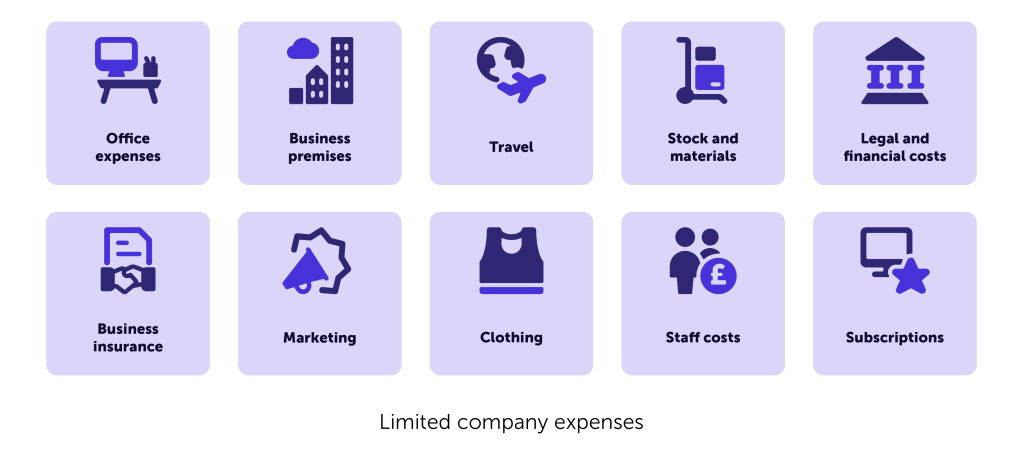Limited company expenses are allowable expenses that your business can claim, helping you reduce your corporation tax bill.
You subtract these limited company expenses from revenue to calculate your company’s profit – and therefore the amount of corporation tax you pay.
Limited company expenses – the essentials
If you’ve set up a limited company, tax-deductible expenses have to be ‘wholly and exclusively’ used for your company. If you pay for something that has a combination of business and personal use – for example you take a work trip abroad and then spend a few extra days on holiday – only the business part of the cost is tax deductible.
But as long as an expense is allowable, you can deduct it from your revenue to calculate your taxable profit.
Generally, any money you spend on entertaining clients or gifts is not allowable, even if it’s a genuine business expense.
It’s important to have a record of all of your limited company expenses, so make sure you keep all of your receipts, invoices, and any other important paperwork.
Keep in mind that you need to keep records for at least six years after you’ve filed your tax return, as HMRC could investigate at any point within this timeframe.
Looking for a more general guide to small business tax? Head over to our tax hub page for more information.
Read more: How long to keep tax records
Limited company expenses list
Many of the costs involved in setting up your limited company and keeping it running are allowable business expenses:
- startup and office expenses
- travel expenses
- marketing costs
- staff costs
- legal costs
- business insurance

Startup and office expenses
The fees that you need to pay to get your business off the ground can be expensed. Any professional services you use, equipment you buy, or general fees you incur can be claimed up to seven years before you start trading.
But when you’re up and running, expenses like rent and utility bills can also be claimed.
Travel expenses
Any travel that’s required for your business can be expensed and it’s not limited to just fuel or ticket prices. You can claim for costs related to:
- hotels
- food for overnight stays
- parking
- toll or congestion charges
- vehicle insurance
- vehicle maintenance and repairs
If you claim for fuel that you’ve paid for with personal cash – you can claim 45p a mile for the first 10,000 miles and then 25p for every mile after that. For motorcycles, you can only claim 24p a mile.
Marketing costs
Whether it’s an expensive campaign or a monthly subscription, social media ads, or affiliate marketing – most things you spend on advertising your business can be counted as a company expense.
Staff costs
You can claim for most costs related to your employees. Salaries, uniforms, and equipment can be claimed but also bigger scale events like staff parties can be claimed up to £150 a person.
And if you run a business where your staff are required to work for extended periods of time looking at screens, you can expense the cost of eye tests and prescriptions too.
Legal fees
If you hire professionals like lawyers or accountants, you can expense the fees you paid.
You can do this at any stage of your business. Whether you’re getting long-term legal support when establishing your business or consulting with someone for a couple of weeks, both can be counted as a company expense.
Business insurance
Protecting your business with business insurance is an important purchase that you can fortunately expense. Any cover applies, whether it’s employers’ or public liability, tools, or contents insurance.
What about capital allowances?
It’s a bit different if you buy an asset for your business. If you buy something that you’re going to keep and use in your business, like a piece of machinery or a work van, you can claim capital allowances on your tax return.
This means that you can deduct the full value of the item from your revenue before tax, using your annual investment allowance (AIA). The AIA has changed several times over the years, but it’s been set to £1 million since January 2019.
What about limited company expenses and employees?
If you provide benefits or expenses to your employees (including to yourself as a director), such as travel expenses or health insurance, you may have to tell HMRC and pay tax and National Insurance on them.
Check the list of employee expenses and benefits on the government website for the rules about each type of cost.
If your employees incur expenses during the course of their work, ask them for receipts so you can reimburse them. You can then include these purchases when calculating your tax deductible expenses.
Remember that normal commuting costs aren’t tax deductible, but you can claim for other staff travel costs, for example when an employee visits a client or goes to a conference.
It’s a good idea to have an employee expenses policy in place so that your employees know which expenses you will reimburse, and know how and when they’ll be paid back.
Tax can be complicated and face fines if you make a mistake on your tax return. Look at the guidelines on the government website and look for professional advice from an accountant if you’re not sure.
Useful guides for small businesses
- Best accounting software for small businesses
- Making Tax Digital – a simple guide
- Changing from sole trader to a limited company
- Is public liability insurance tax deductible?
LIGHTFIELD STUDIOS/stock.adobe.com
